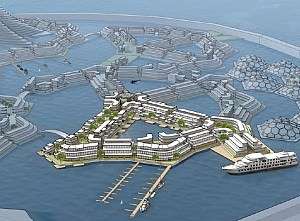If Seasteading Is Wrong, Leaving Your Country and Settling Elsewhere Must Also Be Evil

Most likely because seasteading—creating new and politically independent communities on artificial islands in the ocean—has been proven to be a practical engineering challenge, the once-wacky idea is back in the news.
Bloomberg published a half gee-whiz, half oh-shit-this-might-happen piece that quoted critics of the idea while conceding the technical barriers are falling away. And seasteading is now being assailed with arguments that would just as handily condemn any sort of emigration by dissidents seeking a better life elsewhere.
For Bloomberg, Edward Robinson wrote about the efforts of the Seasteading Institute to develop floating micro-nations:
Forget funky houseboat communes: DeltaSync's 85-page blueprint lays out a watery metropolis worthy of a Roger Moore-era Bond film. ("Live and Let Dive"?) Residential districts, hotels, aquaponic farms for vegetables and fish, and algae-based biofuel refineries would all float on 2,500-square-meter (27,000-square-foot) caissons -- hollow platforms made of concrete, plastic and steel. Arranged in circular clusters, these square-and-pentagon-shaped bases could be disassembled and towed to other seasteads, or to safety in the event of a storm. Indeed, the technology already exists. In 2011, DeltaSync designed a movable dome-shaped conference pavilion that currently floats in Rotterdam's harbor. "Floating architecture is rapidly becoming a realistic option and not just a crazy futuristic idea," says Rutger de Graaf, DeltaSync's director and managing partner.
Robinson quotes a geography professor calling the idea "crazy" without saying just where it goes off the rails. Maybe that's because, as mentioned in the article, Dutch engineering firm DeltaSync says it really can be done.
Criticism of seasteading now takes on an oddly strident tone, and from unusual sources.
A week after reporting on DeltaSync's Seasteading Implementation Plan, Global Construction Review, an online publication of Britain's Chartered Institute of Building, ran an attack on the idea as an abandonment of social responsibility. The publication's editor, Rod Sweet, took time away from the business of covering engineering and construction to "to lay bare the motivation behind the movement—the libertarian urge for the freedom to profit without having to contribute to the social conditions that make profit possible."
Escapism and laziness are in there as well. "Why not reform existing political systems?" the institute asks itself on its FAQ page. The answer is revealing: "It is extremely difficult and costly to significantly impact political outcomes," they write.
Well, yes it is, but the real answers to the world's problems are far duller and more difficult than the backers of seasteading are likely to have the stomach for: negotiated settlements, enlightened governance, strong civil society and political will.
Politics is messy, boring and a blunt instrument, but it's all we've got, and if we want a better world, business elites should have to muck in with their time, effort—and, yes, taxes—like the rest of us.
Got it. So leaving a place behind because you find the political system frustrating, the conditions unpleasant, and the local officials avaricious, is unacceptable. You're expected to stay, make the best of it, and "contribute to the social conditions," no matter what you think of them. Well, so much for emigrating. Hell, so much for loading a van and moving house from California to Texas, or the other way around, if that's what suits you.
This isn't new. Much the same sentiment must have dogged the Pilgrims, who had to sneak out of England to settle first in Holland, and then America. They didn't want to stick around hoping for "negotiated settlements"—they figured they'd have better luck elsewhere.
India's last health minister, Ghulam Nabi Azad, pushed to force physicians to post a bond before permitting them to leave the country; it would be forfeited if they failed to return. Indian Doctors, it seems, have been settling in the United States and elsewhere in search of better opportunity and greater chances for prosperity.
And the United States itself now punishes people who leave the country in an effort to escape what they find to be overly burdensome taxation. Many politicians want to do worse; while unsuccessfully pushing punitive legislation, Sen. Jack Reed (D-R.I.) warned, "it seems that a privileged few are trying to game the system by accumulating wealth and benefiting from the greatness of the United States and then renouncing their citizenship to avoid paying their fair share of taxes."
The entire world has been settled by people looking for a better situation—and very often the situation they sought to improve upon was created by whoever was in charge of the old place. No doubt, those left behind have frequently resented those who left.
Given the history of human settlement, even Rod Sweet's ancestors certainly indulged in "escapism" from another place they found less attractive.


Show Comments (113)